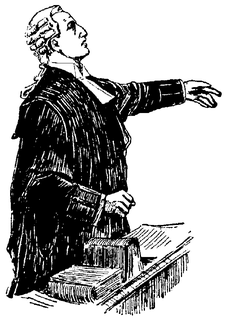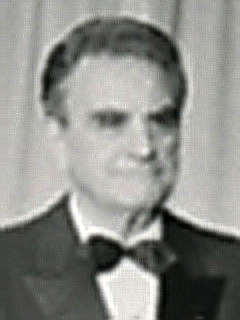
A barrister is a type of lawyer in common law jurisdictions. Barristers mostly specialise in courtroom advocacy and litigation. Their tasks include taking cases in superior courts and tribunals, drafting legal pleadings, researching the philosophy, hypothesis and history of law, and giving expert legal opinions.

A lawyer or attorney is a person who practices law, as an advocate, attorney at law, barrister, barrister-at-law, bar-at-law, canonist, canon lawyer, civil law notary, counsel, counselor, solicitor, legal executive, or public servant preparing, interpreting and applying the law, but not as a paralegal or charter executive secretary. Working as a lawyer involves the practical application of abstract legal theories and knowledge to solve specific individualized problems, or to advance the interests of those who hire lawyers to perform legal services. The role of the lawyer varies greatly across different legal jurisdictions.

The Watergate scandal was a major political scandal in the United States involving the administration of U.S. President Richard Nixon from 1972 to 1974 that led to Nixon's resignation. The scandal stemmed from the Nixon administration's continual attempts to cover up its involvement in the June 17, 1972, break-in of the Democratic National Committee headquarters at the Washington, D.C. Watergate Office Building. After the five perpetrators were arrested, the press and the U.S. Justice Department connected the cash found on them at the time to the Committee for the Re-Election of the President. Further investigations, along with revelations during subsequent trials of the burglars, led the U.S. House of Representatives to grant the U.S. House Committee on the Judiciary additional investigation authority to probe into "certain matters within its jurisdiction", and the U.S. Senate to create the U.S. Senate Watergate Committee. The resulting Senate Watergate hearings were broadcast "gavel-to-gavel" nationwide by PBS and aroused public interest. Witnesses testified that Nixon had approved plans to cover up administration involvement in the break-in, and that there was a voice-activated taping system in the Oval Office. Throughout the investigation, the administration resisted its probes, which led to a constitutional crisis.

In the United Kingdom and in some Commonwealth countries, a Queen's Counsel during the reign of a queen, or King's Counsel during the reign of a king, is a lawyer who is typically a senior trial lawyer. Technically, they are appointed by the monarch of the country to be one of 'Her [His] Majesty's Counsel learned in the law'. The position originated in England. Some Commonwealth countries have either abolished the position, or renamed it so as to remove monarchical connotations, for example, 'Senior Counsel' or 'Senior Advocate'.
A paralegal is a professional in legal sciences that performs procedures autonomously or semi-autonomously. They also work in support or assist professionals related to the legal area of a consultative or judicial litigation nature. Its labor market is broad, including consultancies, companies that have legal departments or that perform legislation compliance activities such as: environmental, labor, controlled products, product registration, trademarks and patents, tax, bidding, among others. Legal offices and public bodies also have many paralegals in support activities although they do not yet use the correct name of the profession.

John Joseph Sirica was a United States district judge of the United States District Court for the District of Columbia, where he became famous for his role in the trials stemming from the Watergate scandal.
Herbert Warren Kalmbach was an American attorney and banker. He served as the personal attorney to United States President Richard Nixon (1968–1973). He became embroiled in the Watergate scandal due to his fundraising activities in the early 1970s, some of which supported undercover operatives directed by senior White House figures under Nixon. Kalmbach was convicted and served 191 days in jail for his part in the scandal, and lost his license to practice law for a time, although he was later reinstated.

The American Bar Association (ABA) is a voluntary bar association of lawyers and law students, which is not specific to any jurisdiction in the United States. It was founded on August 21, 1878. The ABA's most important stated activities are the setting of academic standards for law schools, and the formulation of model ethical codes related to the legal profession. As of fiscal year 2017, the ABA had 194,000 dues-paying members, constituting approximately 14.4% of American attorneys. In 1979, half of all lawyers in the U.S. were members of the ABA. The organization's national headquarters are in Chicago, Illinois, and it also maintains a significant branch office in Washington, D.C.

John Wesley Dean III is a former attorney who served as White House Counsel for United States President Richard Nixon from July 1970 until April 1973. Dean is known for his role in the cover-up of the Watergate scandal and his subsequent testimony to Congress as a witness. His guilty plea to a single felony in exchange for becoming a key witness for the prosecution ultimately resulted in a reduced sentence, which he served at Fort Holabird outside Baltimore, Maryland. After his plea, he was disbarred as an attorney.

The Watergate Seven has come to refer to two different groups of people, both of them in the context of the Watergate scandal. Firstly, it can refer to the five men caught on June 17, 1972, burglarizing the Democratic National Committee's headquarters in the Watergate complex, along with their two handlers, E. Howard Hunt and G. Gordon Liddy, who were Nixon campaign aides. All seven were tried before Judge John Sirica in January 1973.
Professional responsibility is the area of legal practice that encompasses the duties of attorneys to act in a professional manner, obey the law, avoid conflicts of interest, and put the interests of clients ahead of their own interests.

Robert Charles Mardian was a United States Republican party official who served in the administration of Richard Nixon, and was embroiled in the Watergate scandal as one of the Watergate Seven who were indicted by a grand jury for campaign violations. His conviction for conspiracy was overturned because of procedural unfairness and he was not subsequently retried.
Nolo, formerly known as Nolo Press, is a publisher in Berkeley, California, that produces do-it-yourself legal books and software that allows people to handle simple legal matters such as making wills or writing business partnership contracts. Its areas of focus include immigration, family law, employment law, tenant and landlord issues, wills, trusts and intellectual property. Even though Nolo encourages consumers and small business owners to handle their own legal matters when it is reasonably feasible to do so, the company recommends getting professional legal help for disputable or difficult matters.

Charles Frederick Carson Ruff was a prominent American lawyer based in Washington, D.C., and was best known as the White House Counsel who defended President Bill Clinton during his impeachment trial in 1999.
The Washington State Bar Association (WSBA) operates under the delegated authority of the Washington Supreme Court to license the state's nearly 41,000 active and inactive lawyers and other legal professionals. In furtherance of its obligation to protect and serve the public, the WSBA both regulates lawyers and other legal professionals and serves its members as a professional association — all without public funding. The WSBA's mission is to serve the public and the members of the Bar, to ensure the integrity of the legal profession, and to champion justice.

Alexander Williams is an English film animator and cartoonist. He is the son of animator Richard Williams. He has worked on many animated films, and is the author of the Queens Counsel cartoon strip in The Times, for which he was awarded the Cartoon Art Trust Award for Strip Cartooning in October 2017.

Queen's Counsel is a British cartoon strip created by Alexander Williams and Graham Francis Defries, which has been published in the law pages of The Times since 1993. It is a satire on law and lawyers. The strip is published under the pseudonym "Steuart and Francis", these being the middle names of the two authors.
Daniel R. White is an American attorney and author. His first book, The Official Lawyer's Handbook,, a satire of the legal profession, was a bestseller in the early 1980s. The success of the Handbook, which ranked #1 on The Washington Post best seller list and presumably drew on White's personal experience practicing law with the Washington, D.C., law firm of Hogan & Hartson, led to television appearances, speaking engagements, and other books, as a result of which The American Lawyer magazine declared White "The Official Lawyer's Comedian."
Monroe Henry Freedman was a professor of law and the former dean at Hofstra Law School. He lectured at Harvard Law School annually for 30 years, and was a visiting professor at Georgetown Law School from 2007 to 2012. He has been described as "a pioneer in the field of legal ethics" and "one of the nation's leading experts on legal ethics."
Professor Mark Watson-Gandy CStJ is a British lawyer and educationalist, specialising in UK insolvency law. He is the Chairman of the Biometrics and Forensic Ethics Group, a position he has held since 2019.